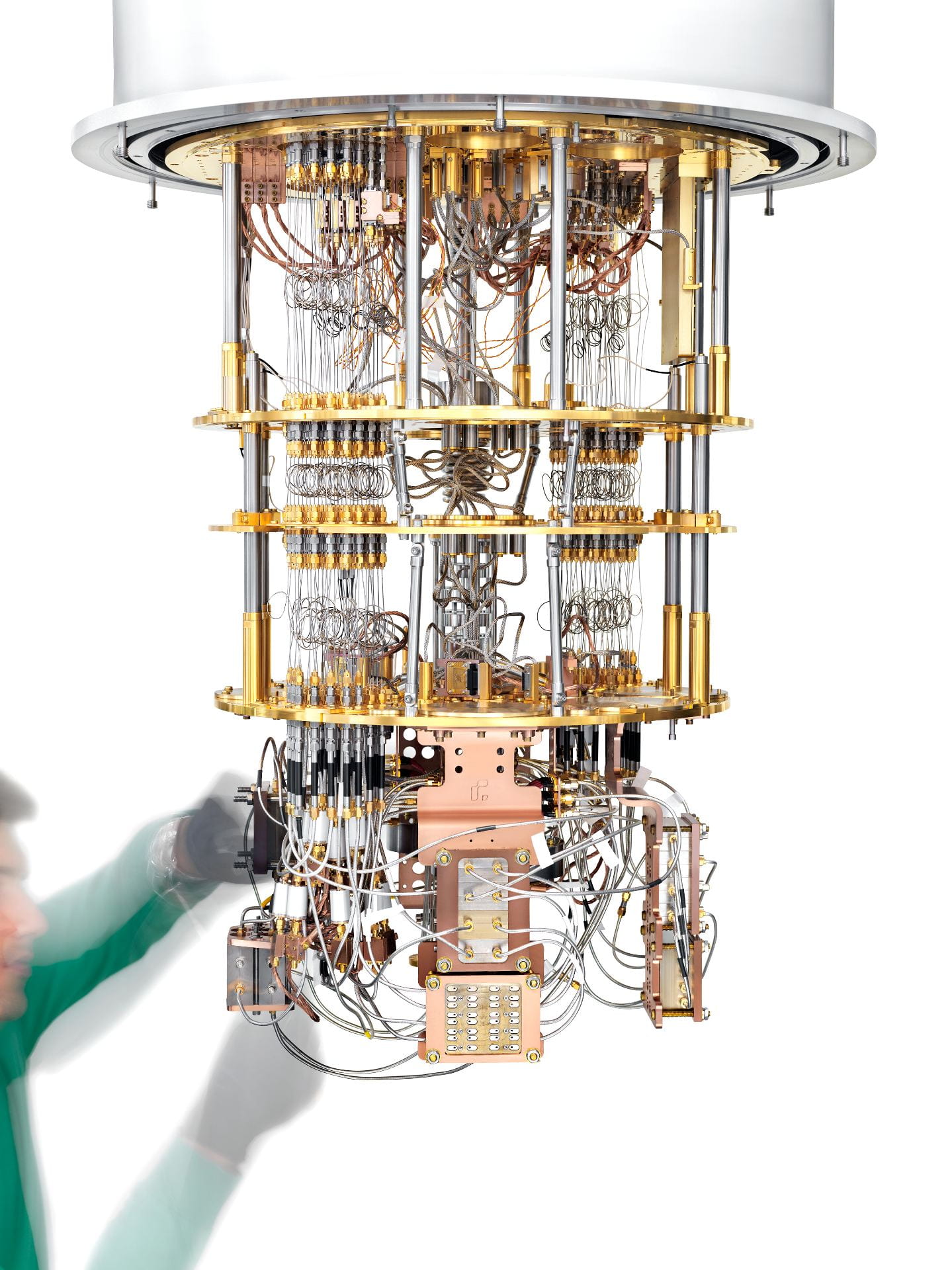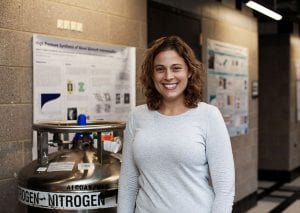From Qubits to Climate Change: Northwestern Quantum Experts See Powerful Potential
By Mike M. McMahon, Sr. Communications Manager, Institute for Sustainability and Energy at Northwestern (ISEN)
 Quantum computer. Image courtesy Rigetti Computing. Photo by Justin Fantl.
Quantum computer. Image courtesy Rigetti Computing. Photo by Justin Fantl.
Imagine there are 20 playing cards laying side-by-side and face down on a table in front of you. You know that one of them is the queen of hearts, but you don’t know which one. To find it, you probably would start turning over the cards one by one. A modern-day computer is designed to take the same approach in solving this problem, albeit much faster than a human. But what if you could find the queen of hearts on the first try every time? This is the type of power enabled by quantum computing.
At Northwestern University, researchers are contributing to the field of quantum computing through the Initiative at Northwestern for Quantum Information Research and Engineering (INQUIRE) — an interdisciplinary consortium harnessing faculty thought leadership from across the University’s top-ranked departments, such as chemistry, materials science, engineering, and physics and astronomy. These thought leaders are also involved in Northwestern’s partnership with several other institutions in the form of the Chicago Quantum Exchange, a knowledge hub that promotes and facilitates regional quantum research.
What is a quantum computer?
It’s important to be clear on this point. Quantum computers have tremendous potential when it comes to solving intricate research questions, but it’s unlikely that the average person will regularly interact with one.
“People often get very excited when they first hear about quantum computing. They think that it means they’ll soon have one at home in their living room and that their video game graphics will suddenly be fantastic. And that’s not quite true,” says Jens Koch, physics and astronomy, and an INQUIRE-affiliated researcher in the Weinberg College of Arts and Sciences.
 From left: James Sauls, physics and astronomy, Northwestern graduate student Xinyuan You, and Jens Koch, physics and astronomy. Sauls and Koch are also affiliated with INQUIRE, with Sauls serving on the quantum initiative's executive committee. Photo by Roger Anderson
From left: James Sauls, physics and astronomy, Northwestern graduate student Xinyuan You, and Jens Koch, physics and astronomy. Sauls and Koch are also affiliated with INQUIRE, with Sauls serving on the quantum initiative's executive committee. Photo by Roger Anderson
The excitement stems from the way quantum computers process information. Classical computers perform operations using "bits," which can only store information in one of two ways — as either a zero or a one.
Quantum computers, however, use quantum bits, or “qubits,” which rely on strange properties of quantum physics that allow for a particle to exist in multiple states at once. This means that unlike the binary bits of a classical computer, each qubit can exist in a state of zero and one at the same time, a phenomenon known as superposition. A second quantum phenomenon known as entanglement refers to a property in which the behavior of one particle can influence another even when they’re not physically connected.
The true magic of qubits is that, unlike classical bits, their computational power scales exponentially. A two-qubit computer allows you to do four calculations simultaneously. A three-qubit machine can perform eight calculations, and so on. A 300-qubit quantum computer could perform more calculations than there are atoms in the observable universe. This characteristic, combined with other peculiar attributes, is what makes quantum computers uniquely powerful.
“We’re still learning about quantum computers and what they can do,” says Koch. “But one thing is clear: there are specific tasks for which quantum computers could greatly outperform any classical computer we could possibly invent.”
Quantum computing and climate change
An illustrative example of the problem-solving power of quantum computing involves one of the most complex problems facing the world today — climate change.
With quantum computers, researchers could flawlessly model complex molecular systems, leading to the development of new materials for higher efficiency batteries. We could more easily replicate processes like photosynthesis and fertilizer production that effortlessly occur in nature but require tremendous amounts of energy to reproduce in the lab. Worldwide industrial production of nitrogen fertilizer alone emits more greenhouse gases than the entire United Kingdom every year, and more efficient methods would be a game-changer, both for the climate and global economy.
Leveraging the power of quantum computing could also allow for the discovery of new superconductors — materials that conduct electricity perfectly without degrading or dissipating over time or distance. To date, the only superconductors discovered operate at extremely low temperatures (-279 degrees Fahrenheit/ -173 degrees Celsius), which has prevented widespread use of these magical materials. But what if we discovered a superconducting material that operated at room temperature?
 Danna Freedman, chemistry. Prof. Freedman is also a member of the INQUIRE executive committee. Photo by Matt Golosinski
Danna Freedman, chemistry. Prof. Freedman is also a member of the INQUIRE executive committee. Photo by Matt Golosinski
“It’s one of the most exciting research questions I can think of,” says Weinberg College chemist Danna Freedman, an INQUIRE executive committee member. “If we could build a superconducting electric grid, we could increase the capacity of wires by a factor of 10,000, and that would enable us to bring online a lot of electrical technologies that our decrepit energy grid is not currently suited for.”
Improved superconductors would also be a miracle for renewable energy technologies, she says. “You could build a solar farm in sunny New Mexico and seamlessly transport the electricity to densely populated areas like New York City. You could turn the superconductors into magnets for the generators in wind turbines, which would create a lot more energy with each rotation of the blades.”
Technology behind quantum computing has made great strides in recent years, but these and similar systems remain in an experimental phase. In addition to the need to develop viable software, the machines are also extremely sensitive to their surroundings, meaning they can be highly error-prone in their current state.
While researchers at Northwestern and elsewhere continue to advance the science behind quantum computing, one thing is clear — from climate change and chemistry to medicine and national defense, this nascent technology may hold the key to solving some of the world’s most complex and pressing challenges.